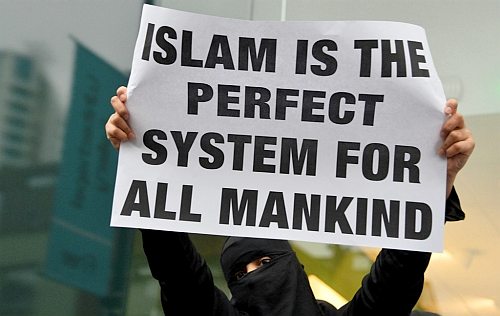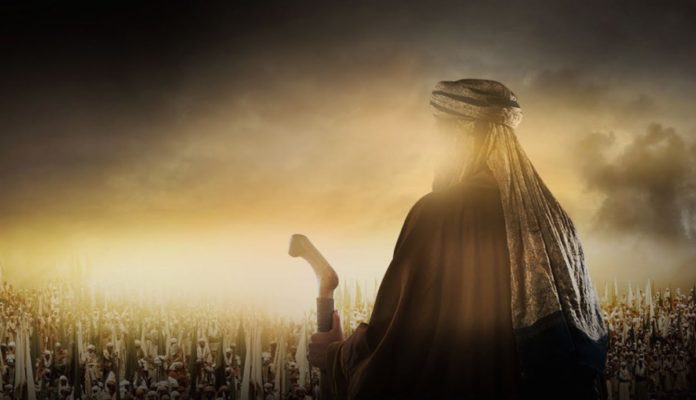
“And if secularism is tolerated in the countries of Europe due to Christianity being distorted, and the clergy having taken control of people’s minds and hearts combating science and scholars in an uncompromising war, and since Christianity does not embrace an integrated system of life, such is not justified in Muslim societies because Islam is a comprehensive and integrated religion. It deals with the issues both of this world and the hereafter, meets the demands of both the soul and the body, while its universal texts are categorized in rulings worked out down to the last detail.”
THE ABOVE STATEMENT is a short excerpt of a lengthy response by the Salafi cleric ‘Abd al-Ḥayy Yūsuf, to the following two questions asked by a friend on the Al-Mishkāt website:
What is the ruling on democracy and its implementation in Islam?
What is the ruling concerning secularism in Islam?
It is well known that all currents of political Islam base their call for the necessity of applying the Sharīʻa, for Islamizing the state and restoring the Caliphate on a claim that Islam is a ‘comprehensive religion’ covering all aspects of life, and that therefore it is impossible to separate Islam from the state, as happened in the Christian religion, which they say is fundamentally different from Islam.
For the currents of political Islam and those advocating the application of the Sharīʻa – according to Ṣalāḥ Sālem – the faith can only be considered comprehensive when it speaks about everything and remains silent about nothing, and when it poses all questions and provides all answers or, as ‘Abd al-Ḥayy Yūsuf maintains in his above response: when it “deals with the issues both of this world and the hereafter.”
Yet in complete contrast to what they claim, the comprehensiveness of the faith and its continued effectiveness actually lies in its genericness and transcendence of recurrent events and in its non-interference in life’s mutable minutiae.
It provides answers to basic existential questions concerning life and death, the creation of the universe its ultimate path and destiny, the destiny of Mankind and the values that should govern his life.
It is in the faith’s sufficiency in offering principles, conceptions and major values, in its avoiding immersion in matters of detail related to how these things are actuated in people’s daily life, that its comprehensiveness is established. This is confirmed by religious scripture (the Qur’ān) and the Islamic historical record.
In the realm of politics and governance, the Qur’ān emphasizes basic general values such as freedom, justice and collective consultation (shūrā), but it is silent on how these are to be applied in the changing vicissitudes of real life, and it does not lay down specific details that must be followed in all cases and in all times. This how the noble Prophet behaved in the actual way, historically he conducted affairs; he did not leave his Companions detailed guide on how to run the dealings of Muslims after his departure, and also refrained from choosing a successor to guide their affairs.
The Qur’ān emphasizes basic general values such as freedom, justice and shūrā, not how these are to be applied
The choice of Abū Bakr al-Siddīq in al-Saqīfa[1] came about in a climate dominated by conflict between on the one hand the Muhajirīn and the Anṣār,[2] and on the other hand between the family of the Prophet and a number of the major Companions. The Anṣār despaired of the appointment of Sa‘d ibn ‘Ubāda after seeing the insistence in this respect of ‘Umar and Abū Bakr and said, “We have a prince among us, and among you there is also a prince,” to which Abū Bakr replied:“We have a prince princes among us, and among you there are but ministers.”
Upon his death, Abū Bakr al-Siddīq did not leave the matter of his successor to the general Muslims or even to the influential decision makers, but instead, shortly before his death, entrusted to ‘Umar Ibn al-Khaṭṭāb a closed book to which the Muslims were to pledge allegiance even without knowing its contents. When in his turn ‘Umar approached his encounter with his Lord, he did not follow the method set by at al-Saqīfa or the Abū Bakr’s method of selection, but limited the choice to six names (‘Alī, ‘Uthmān, Ṭalḥa, Al-Zubayr, Ibn ‘Awf and Sa‘d), to choose from among them who was to assume rule.
As for ‘Alī ibn Abī Ṭālib, he was appointed under the shadow of swords and spears with support from of some cities but opposition from others, after the upheaval following of the assassination of ‘Uthmān. After the assassination of ‘Alī, Mu‘āwiya ibn Abī Sufyān became the sole ruler of the Muslims, and with his assumption of power rulership of the Muslims was transformed into a predatory monarchy. Right up to the present day any ‘systems’ of selecting a ruler have disappeared, leaving only the methods of raw power or inherited succession.
If the Qur’an and the Messenger refrained from laying down a detailed method or a specific means for choosing the ruler, they equally did not put in place a specific system of governance to define the powers and authorities of the ruler, or the decision-making mechanisms in the state, or the term that the ruler remains in power, or any other matters of detail that a system of government must adopt. When discussing the Islamic caliphate Qāsim Amīn[3] noted that:
“Regarding political systems, however closely we research Islamic history, we cannot find in these periods anything that deserves to be termed a ‘system’. Their form of government was that of a caliph or a sulṭān with unlimited powers, administering officials with equally unrestricted powers. One could claim that this or that caliph or sultan was appointed after some individuals in the Nation pledged allegiance to him, and that this indicates that his authority derives from the sovereign people. But in reality, the Sultan was the sole authority.”
The absence of a political theory in Islam confirms what we have argued, that the ‘comprehensiveness of the religion’ means its restriction to setting the general values and principles that the political authority must adhere to in society, without any stipulation of details as to the forms and mechanisms to be taken by the authorities in bringing those principles into practice. It is an ‘existential totalitarianism’ and not a ‘political totalitarianism,’ as Ṣalāḥ Sālim puts it.
It is an ‘existential totalitarianism’ and not a ‘political totalitarianism’
Perhaps one of the most eloquent expressions indicating this existential, and not political, comprehensiveness of Islam is that attributed to the jurist Ibn al-Qayyim:
“Wherever there is justice, then there is where God’s Sharīʻa exists”.
This indicative saying demonstrates that one of the overall purposes of religion is to achieve justice, and it is therefore unimportant what kind of political system (the ‘method’) is adopted to achieve this end, and that simply applying a system to actual life and practice is enough to award it the ‘Islamic’ stamp.

Suggested Reading
Advocates of the Islamization of the state mistakenly think that the absence of major existential values such as shūrā, justice and freedom from the Islamic world is due to the absence of the Islamic state (i.e. the Caliphate). They assume that the return of the latter will ensure the grounding of these values and miss the fact that these values never prevailed in the long history of the caliphate, except for some exceptional and very brief periods. Their absence was thus not due to the demise of the Caliphate, but rather due to the tyranny of that period, a tyranny characteristic of that era in mankind’s history.
Any attempt, therefore, to Islamize the state or restore the Caliphate will not succeed in extending the great values advocated by Islam, so long as the orientations of that state remain founded on the tyranny that prevailed before the emergence of the modern state, and so long as it rejects a democratic system of government whose sole supporting pillars derive from political secularism.
[1] At the Saqīfa compact (Saqīfat banī Sāʽida) the Anṣār raised the slogan: “A leader from you, and a leader from us.” He replied “from us come the rulers, and from you come the viziers” and subsequently followed this with: “the Caliph must be a Qurayshī, in that people will only obey this class of the Arabs.” The incident stands at the heart of the Sunnī-Shīa divide, in that ‘Alī based his claim on an alleged explicit pronouncement of Muḥammad on the occasion of the Prophet’s ‘Farewell Sermon’ at Ghadīr Khumm. But at a hastily arranged meeting later at Saqīfat banī Sāʽida the succession was nevertheless denied him and given instead to Abū Bakr, who became the first caliph. (Ed.)
[2] See Glossary.
[3] Qāsim Amīn (1863-190) was an Egyptian jurist, an Islamic Modernist and one of the founders of the Egyptian national movement and Cairo University. He was a philosopher, reformer, judge, and a central figure of the Nahḍa Movement. (Ed.)


